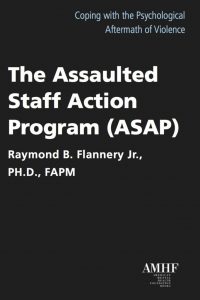The Assaulted Staff Action Program: 30 Years of Service to Employee Victims
by Dr. Raymond B. Flannery Jr. on

It happens. Violence suddenly erupts. It may be in homes, in schools, in factories, in houses of worship, or in the community’s streets. We know what happens. The first responders arrive. The assailant is subdued. The media encamps and reports the incident(s). Counselors arrive to assist the victims and witnesses.
What would happen if violence erupted and no one came to help, no one reported on the episode, and no one came to offer support?
This latter turn of events happens every day in the United States in the form of psychiatric patient assaults on health care staff.
Unlike other episodes of violence, first responders, the media, and counselors do not arrive, and the employee victim is usually left to cope with the support of colleagues immediately nearby.
Moreover, this is not just an issue in the United States. Patient assaults on staff are a worldwide occupational hazard for health care providers.
Certainly, not all patients are assaultive but some are. Whereas the employee victim’s facility is usually able to address any medical injuries that have occurred, the employee victim’s psychological needs are often left unaddressed.
The Assaulted Staff Action Program (ASAP) has been designed to address this need.
ASAP is a voluntary, system-wide, peer-help crisis intervention program to address the psychological aftermath of such patient assaults by restoring the victim’s domains of good physical and mental health: reasonable mastery, caring attachments to others, and a meaningful prosocial purpose in life. ASAP utilizes an array of services as needed. These include individual and group interventions, a staff victim’s support group, family victim outreach, and referral to therapists who specialize in treating psychological trauma, when indicated. The common goal is to reduce the immediate psychological distress and to prevent the onset of posttraumatic stress disorder (PTSD).
When an assault occurs, the ASAP team member on call goes to the site of the incident and offers ASAP services. If the victim declines ASAP, the victim is offered a set of handouts on psychological trauma. If the victim accepts ASAP, the team member proceeds to implement any needed ASAP services.
To insure continuity of care, the same ASAP team member contacts the employee victim after three days and again after ten days to assess the need for any additional ASAP services.
During its 30 years of continuous service, there have been 45 ASAP teams in 9 states. There have been 2,300 trained ASAP volunteers who have responded to 10,651 assault incidents. They have volunteered 2.4 million hours of service to their fellow employees and facilities.
As you would expect, ASAP has been fielded in a variety of mental health facilities. These have included state and vendor inpatient and outpatient settings, community residences, day programs, and shelters for the homeless.
ASAP is versatile and has been utilized in non-mental health facilities as well. ASAP teams have been fielded for the American Red Cross, a state Office of the Chief Medical Examiner, large medical centers, adult prisons, juvenile detention facilities, an aquarium, and a mandated family survivor center of a large international airport.
ASAP teams pay for themselves in reduced industrial-accident claims, sick-leave utilization, medical and legal expense, and lost productivity.
Over the years, ASAP has garnered several local, state, and national awards, and has been selected as an innovative program by the Department of Health, Education, and Welfare of the United States and the Ministry of Health of the Canadian province in Ontario.
Going forward, ASAP will continue to provide needed clinical services to employee victims, and will modify and improve its interventions as quality management indicates.
Suggested Readings
Flannery, R. B., Jr. The Assaulted Staff Action Program: Coping with the Psychological Aftermath of Violence. Riverdale, NY: American Mental Health Foundation, 2012.
Flannery, R. B., Jr. Posttraumatic Stress Disorder: The Victim’s Guide to Healing and Recovery, second edition. Riverdale, NY: American Mental Health Association, 2012.
Raymond B. Flannery Jr., Ph.D., FACLP, a licensed clinical psychologist, is Associate Professor of Psychology (Part Time), Department of Psychiatry, Harvard Medical School, as well as Adjunct Assistant Professor of Psychiatry, Department of Psychiatry, University of Massachusetts Medical School and Adjunct Professor of Psychology (Part-Time), the Woods College of Advancing Studies, Boston College. He is an internationally recognized and award-winning scholar and lecturer on the topics of violence, victimization, and stress management. Dr. Flannery is available for lectures and workshops, for all types and sizes of groups, and may be reached at The American Mental Health Foundation.








 Host Companion
Host Companion